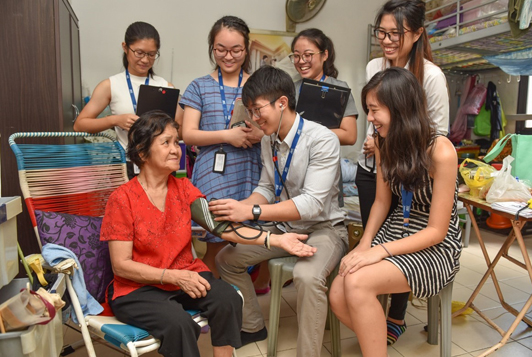Community Engagement Fund

Purpose of CEF
1) The Community Engagement Fund (CEF) is created to support NUS students in initiating and implementing:
- Community engagement projects that address social or community needs locally or overseas;
- Events and programmes that will strengthen the culture of volunteerism and community engagement in NUS. 'Community engagement' is defined as the process of working collaboratively with identified group(s) of people to address areas that impact their well-being.
- Projects to develop our students into individuals with a strong sense of social responsibility and promote integration within communities in Singapore and globally.
2) Students are strongly encouraged to utilise CEF to launch a new project. For an existing project to be funded, applicants must be able to demonstrate enhancement(s) in the form of methodology/implementation plan and/or evidence of sustained impact.
Funding Details & Consideration
CEF provides funding for projects with a deficit, covering up to 80% of the total deficit cost (limited to supportable items) and capped at $5,000 per project.
Funding is on a reimbursement basis, students will have to incur and bear all expenses upfront.
Applications must be submitted at least 1 month before the project's start date.
Projects should be completed by February 2026. Applications will be reviewed on a first come first serve basis.
Below are examples to illustrate eligibility for CEF:
|
Scenario |
A |
B |
C |
|
Project Income |
$10,000 |
$10,000 |
$10,000 |
|
Project Expenditure |
$7,000 |
$14,000 |
$17,000 |
|
Deficit? |
No deficit |
Yes, deficit of $4,000 (only $2,000 are supportable expenses) |
Yes, deficit of $7,000 (all $7,000 are supportable expenses) |
|
CEF funding eligibility? |
No |
Yes |
Yes |
|
Funding Quantum |
|
Up to 80% of $2,000 (supportable items) |
Up to 80% of $7,000 (supportable items), |
Below are examples to illustrate eligibility for CEF:
|
Scenario |
A |
B |
C |
|
Project Income |
$10,000 |
$10,000 |
$10,000 |
|
Project Expenditure |
$7,000 |
$14,000 |
$17,000 |
|
Deficit? |
No deficit |
Yes, deficit of $4,000 (only $2,000 are supportable expenses) |
Yes, deficit of $7,000 (all $7,000 are supportable expenses) |
|
CEF funding eligibility? |
No |
Yes |
Yes |
|
Funding Quantum |
|
Up to 80% of $2,000 (supportable items) |
Up to 80% of $7,000 (supportable items), |
Application Process
Projects that submit their claims in February/March may obtain reimbursement only in May due to the closing of financial year.

Contact Information
For enquiries, contact community.engagement@nus.edu.sg.

